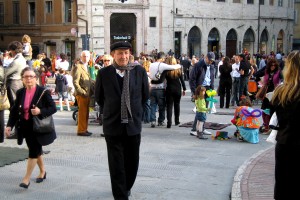An article recently appeared on HuffPost Travel that went quite viral. It is a list of 7 things that would make Americans better off if they would adapt from Italian culture. The article (Original Linked Here) is spot on, and I thought I would add my personal perspective from 30 years of living with one foot in Italy and the other foot in the states. As an American, I have often wished we would live more like Italians, but I have ALSO wished that Italians would adapt some of our culture, especially when it comes to work ethic. Excerpts from the article are copied below with my commentary:
1. Eat slowly, locally and with others.
There’s really no such thing as Italian fast food. Sure, you’ll find a McDonald’s here and there, but in Italy the concept of eating transcends “fast and cheap.” Italy is all about “slow food.” Dinners are unhurried and eaten around a table (not a TV or computer screen) with one’s family. In Italy, food is natural, authentic and sourced locally.
 Read this article that I wrote back in 2006, and you will know exactly where I stand on this. I have always loved how important the meal is for Italians. It is truly a culture of gathering family and friends around the table, and the food is just so important to them. If a meal lasts less than two hours, there is a problem, and the concept of fast service = good service simply does not exist. Rather, if the service is fast, the general feeling is that you are being rushed out. More importantly, however, it is a way for people to really know one another and bond. The result? They are so much more human, warmer. How important is this to them? Suffice it to say that the most common first words you will hear from someone there is “What’s for Lunch/Dinner?” And nothing could make someone quite so proud as having you over for dinner. The culture revolves around it.
Read this article that I wrote back in 2006, and you will know exactly where I stand on this. I have always loved how important the meal is for Italians. It is truly a culture of gathering family and friends around the table, and the food is just so important to them. If a meal lasts less than two hours, there is a problem, and the concept of fast service = good service simply does not exist. Rather, if the service is fast, the general feeling is that you are being rushed out. More importantly, however, it is a way for people to really know one another and bond. The result? They are so much more human, warmer. How important is this to them? Suffice it to say that the most common first words you will hear from someone there is “What’s for Lunch/Dinner?” And nothing could make someone quite so proud as having you over for dinner. The culture revolves around it.
2. Drink a little bit, but not too much.
Italians love their vino. But they don’t overdo it. Here in America, there’s a culture of binge-drinking. In Italy, a bottle of wine is shared among friends or around the dinner table. Stumbling around drunk in Italy is not viewed favorably. Italians like to drink, but they know how to keep it classy.
 One would think that in the world of wine and grappa, that they would be serious drinkers. Absolutely not! The alcohol is not at all about the effects. It is about the quality and flavor. When my wife first came to the states, I remember being with some friends one evening and thinking about what we could do. A friend offered up the idea of going to get some beer and drink. My wife (girlfriend at the time) had the look of utter confusion on her face. She simply couldn’t fathom that “drinking” was a “thing to do”… a goal.. an activity. Drinking is something you might do in moderation while you are doing something else, but never spoken as part of the plan. That is, she may have said “Let’s go to a cafe and relax”. While relaxing, she may order a beer. “A” beer, as in ONE. The idea of drinking alcohol with the goal to get drunk was about as foreign as the idea of eating hamburgers with the goal to get fat.
One would think that in the world of wine and grappa, that they would be serious drinkers. Absolutely not! The alcohol is not at all about the effects. It is about the quality and flavor. When my wife first came to the states, I remember being with some friends one evening and thinking about what we could do. A friend offered up the idea of going to get some beer and drink. My wife (girlfriend at the time) had the look of utter confusion on her face. She simply couldn’t fathom that “drinking” was a “thing to do”… a goal.. an activity. Drinking is something you might do in moderation while you are doing something else, but never spoken as part of the plan. That is, she may have said “Let’s go to a cafe and relax”. While relaxing, she may order a beer. “A” beer, as in ONE. The idea of drinking alcohol with the goal to get drunk was about as foreign as the idea of eating hamburgers with the goal to get fat.
In all of my years in Italy, I cannot say that I have ever seen an Italian get drunk. That is, I have seen them a little buzzed, but never on purpose. Usually if they felt a little buzz, it would go with the comment that they had a little too much.
What I always found really interesting about this is that it is in utter contrast to how we address alcohol issues. That is, we have all sorts of drinking laws in the states. 21 and over, carding people, darkened windows in bars, Sunday laws, open container laws, etc. etc. None of this exists in Italy. A 16 year old kid can walk into a bar and grab a beer. There are no hours during which alcohol can and cannot be sold. There are no taboos. And there is no concept that a parent would deny a glass of wine to their kid because he is too young to drink. But with all of that, you will never see a group of kids in Italy throwing down a 12 pack and getting wasted. NEVER.
3. You should indulge a little every now and then… perché no??
There are so many delicious treats in Italy — rich gelato, mouth-watering pastries, decadent chocolates. Much like the philosophy on drinking, Italian culture has a “perché no?” take on treats. “Perché no?” translates to “why not?” The idea is to treat yourself by having a little bit of something tasty (because, why not?) but not having so much that you’re gorging yourself. Take Italian gelato shops for example… the normal size of a “coppa” (cup) would look tiny compared to the average size of a cup of ice cream in America.
I have always found it curious that Italians are generally MUCH thinner than Americans, and in much better shape overall. I mean think about it, they live for food, and their cuisine is carb loaded to the max. Americans are, in general… FAT. We are obsessed with losing weight, working out, and the diet of the month. Just watch TV for a half hour and tell me how many diet commercials you see. Drive around and count the gyms. Yet we are FAT and out of shape. We think carbs are the devil’s revenge, and to be in better shape we should eat like rabbits and cavemen. Yet Italians have massive 4 course meals full of pasta, bread, and complex sauces. They scarf down the gelato on a regular basis, and don’t believe in artificial sweeteners. There is no “Light Beer” “Guiltless” options on the menu, and rarely do you hear someone tell you they are on the way to the gym.
So what’s the deal? My guess is that it is a combination of the amount they walk and the quality of the food. Everything is natural, organic, etc. No hormones in the meat, and they don’t have the bigger is better mentality. You don’t “Supersize” that dish of pasta. And Italians WALK… A LOT. They don’t get in their cars and drive everywhere, looking for the closest parking spot to the door of the store they are going to. Generally the cities and towns are compact, every store does not have a parking lot.
4. Stop hurrying, start relaxing.
Life is less hurried in Italy. People don’t rush around with to-go cups of coffee, but rather sip their espresso at the “bar” (aka coffee shop). Meals tend to linger, whether they be at restaurants or at home. Pedestrians tend to meander. There’s significantly less emphasis put on being on time — rather, the emphasis falls on how that time is spent. Many Italians take a siesta of sorts — a break during the day, from 1 p.m. – 3 p.m., to eat lunch and relax.
Part of this quote is actually inaccurate, but the overall message is true. Italians do not “sip” an espresso at the bar. They DOWN it. Espresso is meant to be a quick pick me up. Generally one goes to the bar with friends, grabs an espresso, and is out of there in 5 minutes. But it is a social event that may happen 5 or 6 times a day. It is another moment of connecting with people. Additionally, the concept of the siesta really doesn’t exist like it once did.
 The comment of not putting emphasis on being on time is absolutely inaccurate when it comes to things like dinner invitations, but if your electrician is supposed to come at 1:00 PM, don’t expect him to show up before 3. For personal things like the dinner appointment, it is expected that you arrive early with something in hand. The concept of fashionably late does not exist, and the idea that you would have dinner with someone and leave shortly after dinner does not exist. Rather, these things are very insulting!
The comment of not putting emphasis on being on time is absolutely inaccurate when it comes to things like dinner invitations, but if your electrician is supposed to come at 1:00 PM, don’t expect him to show up before 3. For personal things like the dinner appointment, it is expected that you arrive early with something in hand. The concept of fashionably late does not exist, and the idea that you would have dinner with someone and leave shortly after dinner does not exist. Rather, these things are very insulting!
That said, Italians take MUCH more time off than we do. They are generally not workaholics. They generally go out in the evening for strolls to spend time with friends, and they do take a more casual attitde toward most everything. They have all sorts of problems in Italy, but despite them, they manage an amazing quality of life, and I attribute it to the importance of family and friendships.
5. Having family nearby is the best thing ever.
Families in Italy tend to stay in the same area, rather than moving around. Grandparents often care for grandchildren, siblings remain close and extended families are huge and welcoming. While it’s more common in the U.S. to go away for college and settle down somewhere other than where you grew up, it tends to be the opposite in Italy. Having family nearby is deeply valued in Italy. Having nonna(grandma), aunts, uncles and cousins drop by for dinner during the week or having a weekly extended family meal every Sunday is common and brings everyone together.
Yes, Yes, and Yes! Family is everything in Italy. They take care of one another. Some of this I think is wonderful, but there are a few side-effects that I’m not entirely crazy about… but probably because I was raised American. The one I am not so crazy about is the housing situation. To start, many Italians don’t leave home until they are married, and it is not uncommon to see a 35 year old still living with mom and dad. And WHEN he gets married, there is a good chance that mom and dad gave them a condo… across the hall. Yes, they stay VERY close, and I love that. I just prefer a little extra space, if you know what I mean. I know many Italians that still have the in-laws across the hall, or cleaning their house, making their meals, etc. A little too much for my taste.
But the point here is that families really do stay together and look out for one another. While I know that when my son turns 18, he’ll likely move away to god knows where and hopefully I’ll see him on Christmas, in Italy it would be far more likely that he would live close by and be over for lunch on Sunday… that is, if he got off his butt, got a job and his own place
6. Gather and spend time outdoors.
Part of the great communal feel of Italy comes from the fact that people tend to congregate outdoors. Friends will meet up at a piazza and hang out there, rather than in a home. Piazzas are vibrant, outdoor hubs where tons of people gather, children play and tourists roam, creating a lively atmosphere. Similarly, many Italians do most of their shopping at a mercato, outdoor markets where vendors sell everything from food and wine to clothing and leather goods. In America, we have malls — which are great. But there’s nothing like wandering a mercato, sampling the fare and interacting with other locals.
 So true. The piazza (Town Square) is where it’s at. You go there any time and know you will run into friends, so you go frequently. It is something I miss terribly when I am in the states. Here, we go into our garages, get in the car, open the garage, pull out, go somewhere, park, go inside, etc. etc. We lack the human interaction that the piazza and so much else in Italian culture affords. In fact, as I spend winters in the states, I have been looking for a place to live that has the “Piazza” feel to it.
So true. The piazza (Town Square) is where it’s at. You go there any time and know you will run into friends, so you go frequently. It is something I miss terribly when I am in the states. Here, we go into our garages, get in the car, open the garage, pull out, go somewhere, park, go inside, etc. etc. We lack the human interaction that the piazza and so much else in Italian culture affords. In fact, as I spend winters in the states, I have been looking for a place to live that has the “Piazza” feel to it.
7. Maintain a “bella figura.”
Bella figura literally translates to “beautiful figure” — but it’s more idiomatic than that. The idea of maintaining a bella figura is more like the idea of maintaining a good public image. Italians don’t get drunk in public, eat while they walk or wear pajamas to the dinner table because it would have a negative impact on their image. Bella figura is more than just looking good, it’s a way of life that emphasizes aesthetics and good behavior.
Oh dear… an Italian would never do a quick milk run at the store without getting properly dressed and making sure their hair is perfect. They would dare not put on pants that are not properly ironed, and reputation is everything. Your public image is absolutely everything… in positive ways, and also to a fault, I would admit. But hey, ever notice how great Italians always look? Let’s just say that I know a guy that won’t go outside to get his mail without a proper tie around his neck! No, not kidding!
There is more
The article I am commenting on is limited to the seven items above, but in writing this, a few other related things came to mind. Dare I say that I could write a book given enough time to think about this, but here are just a few other things that really impress me about italian culture in contrast to American:
Kids not embarrassed by parents
Does your kid want you to drop them off a few hundred feet away from where they are going? Are they embarrassed to be seen with their parents at the mall? Do they think their parents are stupid and don’t know what it’s like to be a kid? Not in Italy. There is absolutely no concept of any of this in the culture. Parents are respected and honored by the younger generations… really!
Social Status isn’t a Separator
I remember the first time this struck me strongly. I knew a couple men in our town that were multi-multi-multi millionaires (in the hundreds of millions). But you would never know it if you met them. You wouldn’t even have a clue. They didn’t drive Ferraris, They didn’t live in palatial mansions, and they didn’t limit who they socialized with to people “of their station in life”. Rather, you would go to a local cafe and see one of them arguing politics with the local barber. In fact, that local barber may well have been their next door neighbor, because there was no “upscale” neighborhood.
This isn’t an exclusive point. There ARE upscale neighborhoods, there ARE palatial mansions, people DO drive Ferraris, and there is no shortage first class snobs in Italy. But it isn’t nearly as black and white in Italian culture.
I remember while living inLs Angeles at one point I had a very expensive luxury car, and a business associate only started to take me seriously when he saw my car. I also remember when I sold that car because I wanted something smaller, and how once I did so, I got “looks” from people, as though I must not be doing well anymore. I was what I drove, and similarly, my house must be big enough. In Italy this just doesn’t exist. Nobody thinks twice about what car you pull up in. If your lawyer drives to a meeting with you in a little economy car, it doesn’t tell potential you that he is not a successful lawyer because he isn’t pulling up to the valet in a Mercedes. It merely tells you that he is here now.


Thank you. I missed the actual Huffington Post article and like the excerpts and especially your comments. Life is about the journey.
I have to admid that being Italian, I simply loved your article and your point of view.
 We just do not like adding artificial flavours and we tend to eat what we get seasonally. Said that, you can imagine there is a large difference between big cities like Milan or Rome and small towns or villages, but in general the description is really accurate!
We just do not like adding artificial flavours and we tend to eat what we get seasonally. Said that, you can imagine there is a large difference between big cities like Milan or Rome and small towns or villages, but in general the description is really accurate!
It is definitely true…family is really important here and most often we treat our family with good food.
…and yes, I would never wear a pijama while I am eating!
Of course, this things are true to varying degrees in different areas of the country, and I should have pointed that out. The larger cities, especially the more north you go, have lost a bot of that culture. This is especially true in Milan, for example, which is full of fast food drive-throughs and people often work through the day without taking a long lunch. While in Rome, which is a bigger city, a more relaxed life is lived. Still, even in Milan, it is nowhere close to the states.
Interesting but absolutely not realistic. Here in italy the life is fast, we work a lot (mothers works 8 hours a day too), and don’t have time to eat slowly and be so relaxed. And believe me, there are a lot of Italians that driks too much: At launch, at dinner, and expecially young people during saturday night. They dink and drive. Are you sure you can follow the example? Often when american peoples talks about italian life, it seems a description of 50’s movie…
Dorothea, I should have also added that the difference varies greatly between north and south, and well as city and town to a great extent. That said, however, you cannot comment on this correctly unless you live in both cultures. That is, hat an Italian, even in Milano, considers a lot of work, is nothing compared to American culture. Similarly, what you may consider “drinking too much” by young people is nothing compared to what Americans are accustomed to. If you live in American culture by comparison, this article would change your view. That said, the original article I was… Read more »